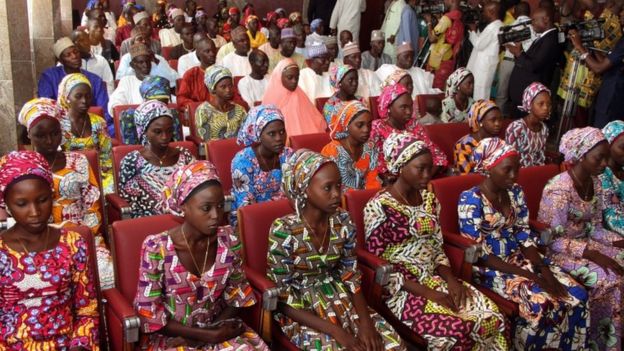Islamist militants of the Boko Haram group have released 82 schoolgirls from a group of 276 they abducted in north-eastern Nigeria three years ago, the president's office says.
They were handed over in exchange for Boko Haram suspects after negotiations.
The girls will be received by President Muhammadu Buhari in Abuja on Sunday, a statement said.
The abduction of the so-called "Chibok girls" triggered a global outcry and sparked a huge social media campaign.
Before the latest release, about 195 of the girls were still missing.
The number of Boko Haram suspects released by authorities remains undisclosed.
The 82 schoolgirls are now in the custody of the Nigerian army and were brought by road convoy from a remote area to a military base in Banki near the border with Cameroon, reports the BBC's Stephanie Hegarty from Lagos.
Our reporter says that many families in Chibok will be rejoicing at this latest news, but more than 100 of the girls taken have yet to be returned.
Christian pastor Enoch Mark, whose two daughters were among those kidnapped, told Agence France-Presse: "This is good news to us. We have been waiting for this day. We hope the remaining girls will soon be released." It was unclear whether his daughters had been freed.
A statement from a spokesman for President Buhari said he was deeply grateful to "security agencies, the military, the Government of Switzerland, the International Committee of the Red Cross, and local and international NGOs" for playing a role in the operation.

Some girls released by Boko Haram last October.
-----------------------------------------------------------------
'Two blindfolded men in convoy'- The BBC's Stephanie Hegarty reports from Lagos
Information about the release began trickling out on Saturday afternoon.
A soldier contacted the BBC to say that more than 80 Chibok girls were being held at an army base near the Cameroon border.
At the same time an official working for an international agency, who assisted with the release, said that several armoured vehicles left Maiduguri - the city at the centre of the Boko Haram insurgency - in a convoy to travel into the "forest" to meet the girls.
He said there were two blindfolded men in the convoy.
The president's office said that the girls were released in exchange for some Boko Haram suspects held by the authorities - but we haven't been told how many.
----------------------------------------------------------
After the Government Girls Secondary School in Chibok, Borno state, was raided in April 2014, more than 50 girls quickly escaped and Boko Haram then freed another 21 last October, after negotiations with the Red Cross.
The campaign for the return of the girls drew the support of then US First Lady Michelle Obama and many Hollywood stars.
Last month, President Buhari said the government remained "in constant touch through negotiations, through local intelligence to secure the release of the remaining girls and other abducted persons unharmed".
Latest Stories
-
WAPCo postpones maintenance exercise to avert looming dumsor
4 minutes -
Sacking Otto Addo is the only response to poor Black Stars performances – Osei Palmer
26 minutes -
Investigators scale barricades to arrest S Korea’s impeached president
1 hour -
Reece James late free kick cancels out Semenyo stunner
1 hour -
IPPG calls on Mahama to retain and reset the Emissions Levy
3 hours -
Resetting the Ghanaian Economy: What to focus on
3 hours -
Mahama’s visit to Bawku is critical for lasting peace – National Peace Council
3 hours -
Scores injured in Walewale as soldiers are accused of brutal assault
4 hours -
Mahama meets Mamprugu king over Bawku chieftaincy stalemate
4 hours -
Mahama calls for robust investment to uplift vulnerable populations
4 hours -
Social media hate speeches harming peace efforts in Bawku – Peace Council
5 hours -
Policy Expectations of the New Government: A robust asset and liability declaration framework
5 hours -
Engender trust to resolve Bawku crisis – Former Defence Minister Dominic Nitiwul advises
5 hours -
Guardiola divorces wife of 30 years
6 hours -
Up to 4 in 10 people could develop dementia after 55. What you can do to lower your risk
6 hours

